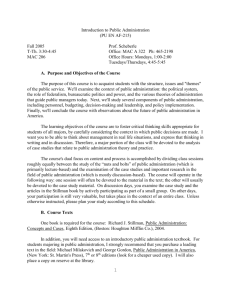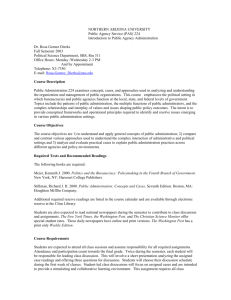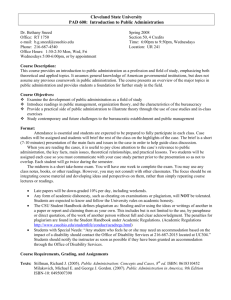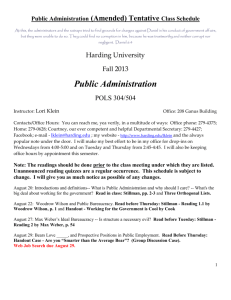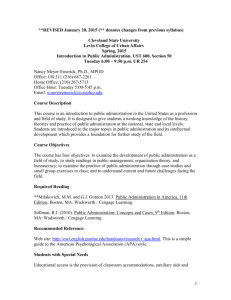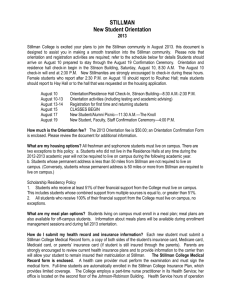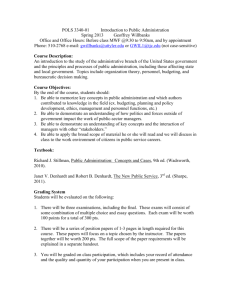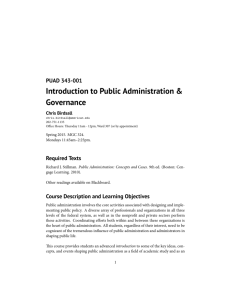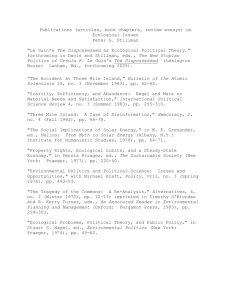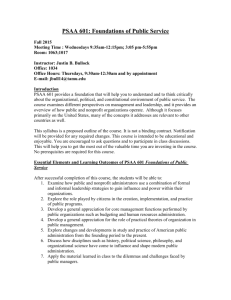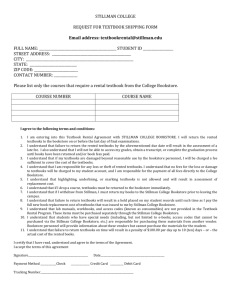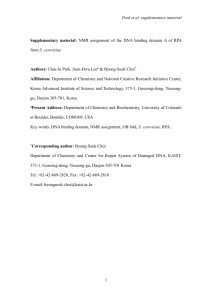urban government i: managing the internal environment (upa 303)
advertisement
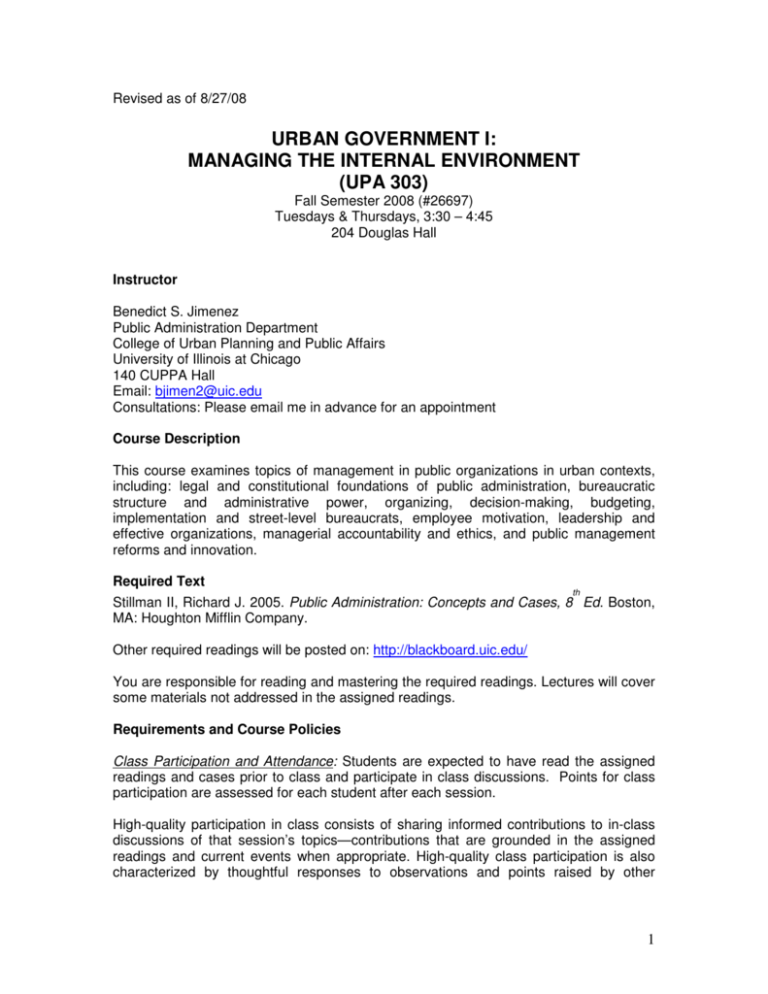
Revised as of 8/27/08 URBAN GOVERNMENT I: MANAGING THE INTERNAL ENVIRONMENT (UPA 303) Fall Semester 2008 (#26697) Tuesdays & Thursdays, 3:30 – 4:45 204 Douglas Hall Instructor Benedict S. Jimenez Public Administration Department College of Urban Planning and Public Affairs University of Illinois at Chicago 140 CUPPA Hall Email: bjimen2@uic.edu Consultations: Please email me in advance for an appointment Course Description This course examines topics of management in public organizations in urban contexts, including: legal and constitutional foundations of public administration, bureaucratic structure and administrative power, organizing, decision-making, budgeting, implementation and street-level bureaucrats, employee motivation, leadership and effective organizations, managerial accountability and ethics, and public management reforms and innovation. Required Text th Stillman II, Richard J. 2005. Public Administration: Concepts and Cases, 8 Ed. Boston, MA: Houghton Mifflin Company. Other required readings will be posted on: http://blackboard.uic.edu/ You are responsible for reading and mastering the required readings. Lectures will cover some materials not addressed in the assigned readings. Requirements and Course Policies Class Participation and Attendance: Students are expected to have read the assigned readings and cases prior to class and participate in class discussions. Points for class participation are assessed for each student after each session. High-quality participation in class consists of sharing informed contributions to in-class discussions of that session’s topics—contributions that are grounded in the assigned readings and current events when appropriate. High-quality class participation is also characterized by thoughtful responses to observations and points raised by other 1 students. Participation is not voluntary. You will be called upon to answer questions related to the readings for the week. Group Reports: Students will form groups of two (2) and jointly analyze one (1) case study assigned for the week. Team members will then give a 20-30 minute presentation of their joint analysis of the assigned case study to the full class (including brief summary of the case and the team’s answers to the case study questions listed in the book), and be prepared to answer additional questions from the instructor and other students. The group is also required to submit a written report of between 5-7 pages (double spaced) which is due on the day of the presentation. Additional instructions to follow. Cases 2 and 3 4 6 and 7 8 and 12 13 10 and 11 14 and 16 Oral Reports September 4 September 11 September 18 October 2 October 16 October 30 November 13 Exams: There will be three in-class exams. Exams are essay and short answer, but primarily essay. You will be given a choice of questions—for example, three or four out of five questions. Requests to make up an exam must be emailed before the day of the exam and a reasonable excuse provided (e.g. sickness or familiy crisis) Exams Exam I Exam II Exam III Date October 7 November 6 December 4 Email and Communication: Students are expected to become familiar with Blackboard and use as directed. All students should check Blackboard and their UIC email regularly. Periodically, communication about homework assignments or readings may be distributed using the email addresses noted in the Blackboard system so it is expected that students will check their accounts at least twice per week. Others: Students are not allowed to redo assignments or do additional work (e.g. paper) for extra credit. Late assignments will be penalized unless you have a legitimate excuse or crisis causing the delay in completing work (e.g. illness, family death) and I must be contacted immediately if such is the case. The grade you earn by the end of the semester is your grade. An “Incomplete” is only earned by students with legitimate excuses/crises and who make requests prior to the end of the course. 2 Plagiarism and cheating are penalized severely, in accordance with university sanctions. Guidelines for academic integrity at UIC are online www.uic.edu/depts/sja/integrit.htm and sanctions for academic dishonesty are also found at: www.uic.edu/depts/sja/chpt3.htm#3. PLEASE KEEP COPIES OF ALL YOUR WRITTEN WORK! Grading Grades will be based on the following: Requirements Points Class participation Group oral report Exams (3 exams, 225 points each) 100 225 675 TOTAL 1000 Final grades: 1000-900 points=A; 899-800 points=B; 799-700 points=C; 699-600 points=D; and 599 points or fewer=F 3 CLASS MEETINGS AND READING ASSIGNMENTS (Subject to change) *** Required reading, download from Blackboard All Stillman chapters and cases are required readings PUBLIC ADMINISTRATION: ENVIRONMENT, STRUCTURE, AND PEOPLE Week 1: The Rise of the Administrative State and the Study of Administration August 26: Review the course and syllabus; assign group case study analysis August 28: Stillman, chapter 1 Try to read Stillman, case 1, “The Blast in Centralia No. 5” (We will discuss the case if we have time) Week 2: Bureaucracy and Organizational Ecology September 2: Stillman, chapters 2 and 3 September 4: Stillman, case 2, “How Kristin Died”, and case 3, “Dr. Helen Gayle and the AIDS Epidemic” Week 3: Administrative Power September 9: Stillman, chapter 4 *** John Bohte, and Kenneth Meier. 2000. Politics and the Bureaucracy: Policymaking in the Fourth Branch of Government. Belmont, CA: Wadsworth Publishing Co. – chapter 4 September 11: Case 4, “The Columbia Accident” Week 4: Group Dynamics and Bureaucratic Competition September 16: Stillman, chapter 6 and 7 September 18: Case 6, “American Ground: Un-building the World Trade Center” and case 7, “The Decision to Go to War with Iraq” INTERNAL MANAGEMENT: FUNCTIONS OF PUBLIC ADMINISTRATORS Week 5: Managing in the Public Sector and Decision-Making September 23: ***Graham Alison. “Public and Private Management: Are they Fundamentally Alike in All Unimportant Respects?”, reprinted in J. Shafritz and A. Hyde. 1997. Classics of Public Administration. US: Thomson Learning ***Fottler, M.D. 1981. “Management: Is it Really Generic?” Academy of Management Review 6: 1-12. September 25: Stillman, chapter 8 4 Week 6: Budgeting September 30: Stillman, chapter 12 ***Allen Schick. 1966. “The Road to PPBS: The Stages of Budget Reform”, Public Administration Review. 26(4): 243-258. October 2: Stillman, case 8, “The MOVE Disaster” and case 12, “Wisconsin’s Budget Deficit” Week 7: Exam October 7: Review October 9: Exam I (3:30 to 5:30) Week 8: Implementation and Street-Level Bureaucrats October 14: Stillman, chapter 13 ***Michael Lipsky. Street-level Bureaucracy: The Critical Role of Street-level Bureaucrats. reprinted in J. Shafritz and A. Hyde. 1997. Classics of Public Administration. US: Thomson Learning October 16: Stillman, case 13, “They Had a Plan” Week 9: Public-Service Motivation and Representative Bureaucracy October 21: Stillman, chapter 11 ***Chon-Kyun Kim. 2003. “Representation and Policy Outputs: Examining the Linkage between Passive and Active Representation.” Public Personnel Management 32(4): 549-559. TBA: Possible guest speaker October 23: No class. I will be at the Association for Budgeting and Financial Management conference. Week 10: Leadership and Effective Organizations October 28: Stillman, chapter 10 ***Patricia Ingraham et al. “Linking Dimensions of Public Sector Leadership to Performance”, in P. Ingraham and L. O’Toole (eds.) 2004. The Art of Governance: Analyzing Management and Administration. Washington D.C.: Georgetown University Press. October 30: Stillman, case 10, “The Lessons of ValuJet 592”, and case 11, “Who Brought Down Bernadine Healy?” Week 11: Exam November 4: Review November 6: Exam II POLITICS AND ETHICS Week 12: Ethics and Public Administration November 11: Stillman, chapters 14 and 16 November 13: Stillman, case 14, “Reinventing School Lunch: Transforming a Food Policy into a Nutrition Policy”, and case 16, “The Case of the Butterfly Ballot” 5 ADVANCE TOPICS: THE TRANSFORMATION OF PUBLIC MANAGEMENT Week 13: Market-Based Management Reforms and Tools November 18: ***Donald Kettl. 2005. The Global Public Management Revolution. Washington D.C.: Brookings Institution – chapters 1, 2 and 3 November 20: ***Ruth DeHoog and Lester Salamon. “Purchase of Service Contracting”, in L. Salamon and O. Elliott (eds.) 2002. The Tools of Government: A Guide to the New Governance. Oxford: Oxford University Press. 319-339. November 21:. Week 14: Contracting and Internal Management Capacity November 25: ***Mark Schlesinger et al. 1986. “Competitive Bidding and States’ Purchase of Services: The Case of Mental Health Care in Massachusetts”, Journal of Policy Analysis and Management. 5, 2 (Winter): 245-263 ***David Van Slyke. 2003. “The Mythology of Privatization in Contracting for Social Services”, Public Administration Review. 63, 3 (May/Jun): 296-314 November 27: Thanksgiving (no class) Week 15: Exam December 2: Review December 4: Course evaluation and Exam III (3:30 to 6:00) 6
